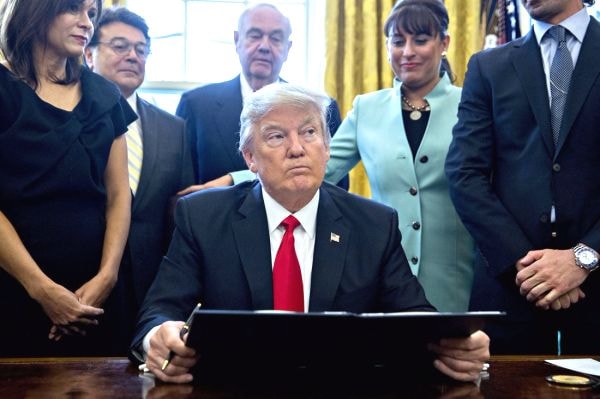Tech companies confront immigration order
(Baonghean) - US President Donald Trump's immigration decree has been a hotly debated issue for many days. Especially, when the US is a paradise for technology enthusiasts around the world, this immigration decree is also a major concern for technology companies...
Tech companies' moves
In late September, a group of tech executives launched a fundraising campaign for Hillary Clinton with a goal of $100,000. However, the campaign had raised just over $76,000 by the time the election was over. In fact, before the election, the big American tech companies in Silicon Valley were not worried about whether Trump would win.
 |
| Protest outside Google headquarters in California. Photo: New York Times |
It wasn’t until President Trump issued his executive order restricting immigration last month that tech companies really got involved in politics. These giant corporations were under pressure from workers, customers, and even their ideas. Nearly 130 companies, mostly in the tech industry, filed a brief on Sunday with the U.S. Court of Appeals, which refused to reinstate the ban after a lower court struck it down. The brief was signed by a coalition of companies large and small, including Apple, Facebook, Microsoft, Google, Tesla, Uber, and Intel, arguing that Trump’s order “violates immigration law and the Constitution.”
According to Sam Altman, who runs Y Combinator, an incubator for startups, when deciding to oppose President Trump's decision, these technology companies are simultaneously participating on three fronts. First, they are opposing policies that have a negative impact on them, next, they are trying to join the president in the hope of influencing his decisions. Finally, these companies want to create new technologies that can counter policies they do not support.
The tech companies that have joined the anti-Trump protests include some of the world’s richest and most prominent corporations, which means they have great leverage. But they are also vulnerable to the wrath of their customers and employees.
Many of these companies had hoped to contribute to President Trump’s decision in an optimistic meeting when he was elected in December. Among them was Travis Kalanick, the CEO of Uber, who joined the government’s advisory council but left the position after the decision was made late last month under pressure from customers.
Reason for confrontation
There are many factors that have put Silicon Valley companies at odds with President Trump’s immigration order. The most widely known is that these companies are often founded or run by immigrants, which makes the immigration order counterproductive and threatening to their businesses. Tech companies often emphasize the importance of talent from different countries. Another factor is that tech workers tend to have a very high political consensus, with almost everyone on the same page, according to Ken Shotts, a professor of political economy at Stanford. Moreover, the job market in the tech industry is not abundant.
Executives can’t ignore the large pool of highly skilled immigrants. And there’s a notion that Silicon Valley is built on—that the work done there is meant to build a better future. So the fact that some kind of unreasonable prohibition would be scrutinized here, as Google’s old slogan “Do no evil” strongly suggests.
 |
| Image of President Donald Trump signing the immigration decree. Photo: Time |
Since President Trump’s executive order was announced, companies have been working hard to stand up for their employees. Microsoft, for example, initially offered a relatively vague statement, but just 24 hours later, it became more direct, declaring the order “misguided and regressive” and “damaging to America’s values and reputation.” In fact, only 76 Microsoft employees were directly affected by the immigration order, but the pressure was still so strong that the company decided to protest the ruling.
The deep roots of problems related to racism, religion, nationality... can come from information and different views in society. In fact, the solutions to resolve conflicts within the US can also come from these technology companies.
2016 has seen the dramatic impact of technology on the polarization of society. Trends on the internet, social media, and fake news can influence the thinking of many people. Therefore, the important thing that companies in Silicon Valley can do is use technology to reduce polarization in a country. McClure, the incubator of 500 startups, said that Google has solved the spam problem in the past 10 years, there is no reason why they cannot stop profiting from fake news.
Phan Vu
| RELATED NEWS |
|---|

